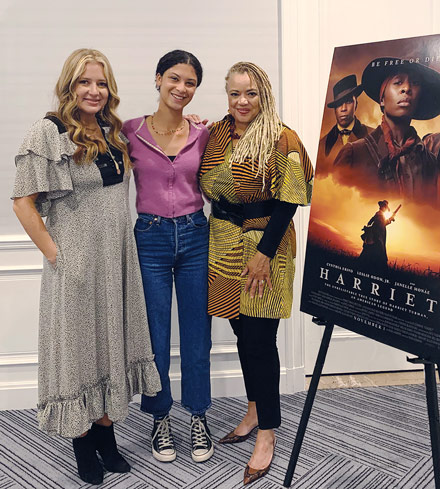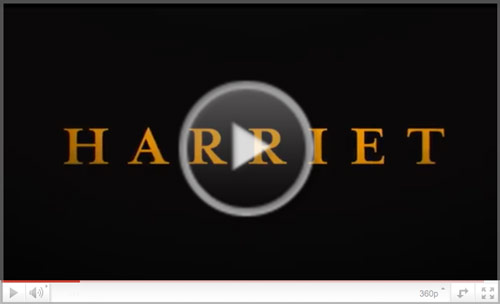ARTS & ENTERTAINMENT - October, 2019
Harriet
Freedom: What We Live and Die For
FastForward talks with Daniela Taplin Lundberg and Kasi Lemmons
WRITER: Zadie Winthrop, Sophomore, Urban School Of San Francisco

Harriet Tubman is a name no one hears enough. Kasi Lemmons, Director of the movie Harriet, and Daniella Taplin Lundberg, Executive Producer, are on a mission to change that.
Harriet opened nationally November 1st. A tale of freedom and strength, Harriet memorializes Harriet Tubman’s remarkable contributions to American history.
Harriet Tubman is well known for escaping enslavement herself, then leading others to freedom, but Harriet illustrates her in a new form. In Harriet, Tubman is the champion of freedom, a woman constantly running towards her death with a mission to provide liberty for others, yet dodging it by the power of her own merit and strength.
“We talked about this young woman as a real-life superhero,” said Taplin Lundberg. Both Lemmons and Taplin Lundberg have found themselves astounded by the physical and emotional strength of Tubman. In the movie, there is a scene in which Harriet says, “I prayed to God to make me strong enough to fight and that’s what I’ve prayed for ever since.” To Lemmons, this quote beautifully represents Tubman’s fighting spirit. “People pray for strength all the time and that emotional fortitude is implied, but this woman prayed to God to make her strong enough to fight. She’s a warrior.” says Lemmons.
Lemmons and Taplin Lundberg struggled with how vividly to depict slavery. “As a filmmaker,” Taplin Lundberg said, “I think you are certainly capable of doing that intense filmmaking, but it was a collective choice to hint and let you know how horribly intense [slavery] was, but this was [also a] tale of hope and freedom,” said Taplin Lundberg.
For Taplin Lundberg telling Tubman’s story implies a “duty… to make the best movie we could, a really entertaining movie. We were inspired to reach the biggest audience we could, because this is not a story everyone knows.” In order to achieve this mission of reaching a wide, family-friendly audience, Lemmons and Taplin Lundberg had to be intentional in what they choose to include in the film.
“I really wanted you to know what the repercussions would be [for attempting to run away as an enslaved person], because they were horrible. People were maimed and disfigured and tortured to death and then hung out by the road as a warning to other slaves,” said Lemons. But, while understanding that reality is essential to understanding what Harriet and other slaves were risking with each journey to freedom, these are vivid detail that Lemmons and Taplin Lundberg chose not to include in the film.
While it was essential to Harriet’s directors that the film be historically accurate, they were committed to not creating, “a stodgy artful biopic that some people would like,” said Lemmons. Instead, Harriet is an adventurous and thrilling film of freedom, with the power to capture all eyes. Following a mission of historical accuracy, Lemmons choose to include the n-word in the film. Lemmons felt it was necessary to include it because, as she says, “we can’t clean up history, we have to present history, cause that’s how we learn.” It deeply mattered to both Lundberg and Lemmons that Harriet honestly portrayed slavery and its horrors, while remaining a story of liberty.
“When I thought about what I wanted us to deliver, I really wanted to make a film that was about freedom. It’s got slavery in it, but it’s not about slavery because the Harriet Tubman story exists in freedom.” said Lemmons. Tubman was someone who commanded her freedom, and as Lemmons sees it, “Harriet’s real story is what she did while free.”
“Freedom. It is what we fight and die for in this country and in countries around the world,” says Lemmons. Harriet will allow you to see Tubman, as Taplin Lundberg says, as “a superhero in her own right, just fighting for what’s right.” Harriet is a tale of hope and freedom, and one of “looking forward and trying to make change,” says Taplin Lundberg. And, Lemmons adds, they want Harriet to inspire questions: “What can I do? What can I fight for in [my] life? In the greater world? For [my] country?” Lemmons and Taplin Lundberg want you to leave Harriet ready to fight for the change you want to see.

